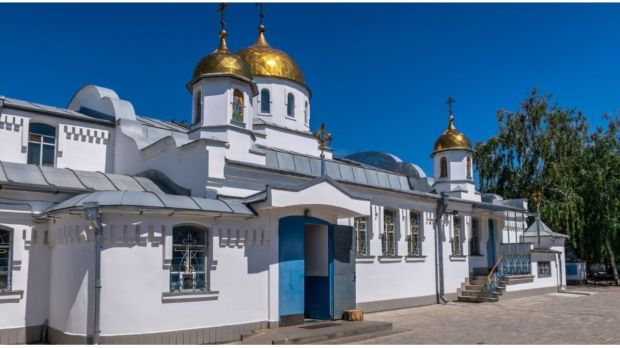Thursday 7 April 2022
1. Churches in Ukraine stand up to Russian abuses in Bucha
2. Opposition to Pope Francis is rooted in a rejection of Vatican II
3. The story of the “Parmureli” that the Pope uses during Palm Sunday
4. The question of the Catholic vote in France as seen from the German part of Switzerland
5. When a Cardinal-poet and a soccer manager discuss transcendence
Churches in Ukraine stand up to Russian abuses in Bucha
The Major Archbishop of the Ukrainian Greek Catholic Church, H.B. Sviatoslav Shevchuk accuses Russian forces of committing “horrific war crimes” in cities near Kiev. Comparing Russian abuses to Nazi crimes during World War II, the major archbishop of Kiev says it is important that “the whole world sees and hears” what happened in Bucha, a town where more than 400 bodies were found after the departure of Russian troops. Metropolitan Epiphanius, head of the Independent Orthodox Church of Ukraine, explains that the ideology of the “Russian world”, carried by the Kremlin, must “be rejected and condemned in the same way that Nazism was condemned”. “Are you with God or with the devil?” the Orthodox metropolitan asks, claiming that the Patriarch of Moscow “has already made his choice in favor of the affairs of the antichrist.” “Open your eyes, look at the poisonous fruits of his teachings, stay away from the lawless, do not be his accomplices,” he asks of “those who still have him as their shepherd.”
The Tablet, English
Vatican II still divides, notes historian of religions Massimo Faggioli in a long column, while emphasizing that this division is felt more under the pontificate of Francis. The pontificate is ” embattled at the theological level” by his detractors whoa re rooted in “the opposition to Vatican II”, the Italian historian analyzes. However the theological crisis did not begin with this pontificate. The author elaborates a retrospective of the reception of Vatican II, especially in the United States: the Council was firstly recognized, received or rejected, followed by a period in 1980s where the Council was reconsidered and enlarged, and finally the Council was historicized and deplored in the 1990s and early 2000s. “Vatican II is not a failed council,” the theology professor asserts, but the reception of a council “takes a long time, at least a century to be fully implemented.”
National Catholic Reporter, English
The story of the “Parmureli” that the Pope uses during Palm Sunday
While most Catholics will receive palm fronds or other local tree branches on Palm Sunday, Pope Francis and the cardinals in St. Peter’s Square will be carrying elaborate palm weavings known as “parmureli.” The Pillar dives into the origin of these hand-braided creations, which are usually sent to the Vatican from the northwestern Italian cities of Sanremo and Bordighera. In 1586 Pope Sixtus V asked for an 85-foot Egyptian obelisk to be moved to the center of St. Peter’s Square. As the massive structure required great concentration to be properly installed, the pontiff ordered for complete silence in the square. As the obelisk was being raised the ropes began to fray under the weight of the artifact. At that moment sea captain Benedetto Bresca yelled at the workers to put water on the ropes to avoid them breaking. Although he violated the order of silence, Pope Sixtus decided to thank him for his help by making him and his descendants the official Vatican suppliers of palms for Palm Sunday. More than four centuries later the “parmureli” are still handwoven in northwestern Italy.
The Pillar, English
The question of the Catholic vote in France as seen from the German part of Switzerland
A few days before the first round of the French presidential elections, the Swiss monthly Herder Korrespondenz believes that the question of the Christian vote will be of particular importance in this election. Although there are only between 2 and 3 million practicing Catholics, they do not abstain and constitute a significant source of votes, explains journalist Birgit Holzer. She cites the importance of the trip made by the candidates Eric Zemmour and Valérie Pécresse to Armenia during their campaign, a maneuver aimed at recovering the 400,000 votes of this Christian diaspora in France. According to Holzer, a battle is being played out between the candidates and she notes that by campaigning on the Christian roots of France and against societal laws, Eric Zemmour seeks to challenge previous parties that had won the “traditionalist” vote. On the other hand, in 2017, the outgoing president Emmanuel Macron had received 62% of the votes of practicing Catholics. However, he systematically ignored Catholics during his term, whether on laws concerning bioethics or on the issue of opening churches during the pandemic. “We could see more Catholics taking the plunge and voting for the far right,” says sociologist Philippe Portier.
Herder Korrespondenz, German
When a Cardinal-poet and a soccer manager discuss transcendence
“In the preparation for a high level competition, which involves pressure and responsibility, training is no longer enough, something must be added, which in my opinion is related to spirituality,” said José Mourinho, Portuguese coach of the Roma soccer team when he met his compatriot Cardinal José Tolentino de Mendonça, archivist and librarian of the Holy Roman Church, at the Vatican Apostolic Library. The two men discussed the link between sport and transcendence. In particular, Mourinho spoke of the “cruel facets” of top-level sport, reminding that “we cannot let the nature of our work override who we are as people.” He also confessed to the Portuguese cardinal his devotion to Fatima as well as to Pope Francis, explaining that the latter was right and that the war in Ukraine was “a human failure before a political one.” The Pope’s collaborator expressed his “great happiness” after this meeting and ended by insisting on the importance of reflecting on “failure” as a “fundamental step to be able to grow in the knowledge of the other.”
Ecclesia, Portuguese

